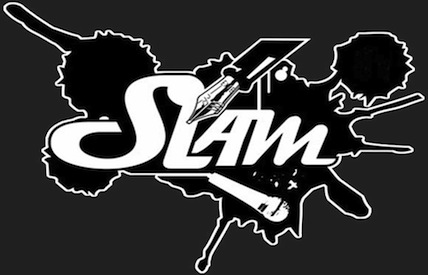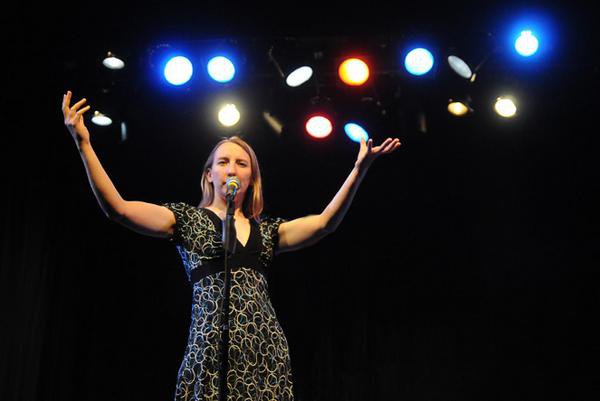It’s a late winter Sunday night and I’m at my first slam poetry event. Aptly called Slam Sunday, these free events take place on the first Sunday of each month at seven o’clock. I’m nestled in a plush brown leather sofa in Accents Coffee and Tea Lounge, nursing a cup of peanut butter hot chocolate that is so addictive Nigella Lawson would go nuts for it (allegedly). The homely basement lounge is slowly filling up with college students in garishly mixed clothes, men with excessive facial hair and an abundance of hat-wearers all posed with varying degrees of nonchalance on bean bags and couches.
Aptly called Slam Sunday, these free events take place on the first Sunday of each month at seven o’clock
Suddenly I’m worried. I’m the sort to have recordings of poets on my iPod, to spend hours watching videos from slam competitions the way others would watch marathons of Breaking Bad. I may or may not have a poster of Frank O’Hara. What if I’ve accidentally stumbled into nothing more than a romantically lit den of hip people equipped with a rhyming dictionary? My disappointment will mate with my embarrassment and kill me. I call this poetry nerd’s remorse.
I’m gnawing on the lip of my takeaway cup when a sizeable gang of what I’m inclined to call “youths” walk in.
What if I’ve accidentally stumbled into nothing more than a romantically lit den of hip people equipped with a rhyming dictionary?
Not your garden variety youths either. Their chic coats, chinos, artfully tousled hair and purposely oversized hoodies hint at a superiority: they’re cultured. I recognise the smiling, mop haired guy leading the pack from the event’s Facebook page. He’s Stephen Clare, last month’s third prize winner and an up-and-coming voice in Dublin’s flourishing slam scene. He settles himself in the centre of the room in a small sea of eager teenagers. Along the edges of the room stand a few more people, some in their thirties and others in their sixties. This is what slam in Dublin looks like.

Slam poetry began in 1984 in The Green Mill, a Chicago jazz club, when construction worker Marc Smith decided he’d add some spark to his poetry readings by having poets perform in public against each other competitively. The movement rapidly took off, morphing over almost three decades to the rigidly structured art form we see tonight.
In traditional slam poetry, poets recite from memory full original poems without the use of props, backing tracks, musical instruments or costumes and under three minutes. Audiences show their appreciation not by clapping, cheering or shouting but rather by clicking their fingers. Here, the poets sign up on the night and twelve are selected at random to perform. Two rounds are performed. The winners of each round face off in a final round to decide the winners of first and second place, with third place being chosen by the audience. The winners receive cash prizes of €50, €30 and €20 respectively. Five judges are chosen at random from the audience to score the poets after each round, five points for style and five for content.

“Like the Olympics but with words and … less snow,” booms Aidan Murphy, the master of ceremonies at each Slam Sunday and also the chief organiser of the Monday Echo, a popular poetry and songwriter’s event that takes place every Monday night in the International Bar. While that venture has been steadily growing over its two-year run, Slam Sunday is a very recent addition to the Dublin arts scene starting only three months ago.
“There was a lack of just slam poetry.”
“One thing I noticed in Dublin was that there weren’t many venues that did purely spoken word,” Murphy says of his intentions when starting the event. “There was a lack of just slam poetry. I was looking for a way to do a slam competition but I didn’t have time with the Monday Echo. I also wanted to do it acoustically and in a non-drinking venue as they’re usually in pubs or licensed venues which is a problem for people who don’t drink or those who are under eighteen. This is a way of getting a huge amount of people up on stage reciting slam poetry from memory and of getting some money to people every month.”
While Slam Sunday is the first and only one of its kind to focus on pure, traditional slam poetry there are an abundance of similar events held weekly dedicated to spoken word, music, comedy or song writing.
“This is a way of getting a huge amount of people up on stage reciting slam poetry from memory and of getting some money to people every month.”
Petty Cash are a collective committed to providing spoken word theatre to audiences, particularly young people, around Dublin and offering would-be performers a chance to tap into the one medium that is designed to be accessible. Their list of inspirations reads like a page torn from Jack Kerouac’s notebook, had he lived in Dublin: “Our relationship with the city. Our relationship with the generation we are emerging from. And the tensions between this generation and generations who have gone before. Going to clubs, leaving early and getting chips. Getting up for work. Pop music. The financial crisis. The internet. The ways we communicate, and the ways we connect. Most importantly, we are interested in making work about Dublin City as it is today, as experienced by ourselves and by our peers.”

The Brownbread Mixtape puts on one of the most highly regarded events in Dublin’s art scene in an iconic venue
The Brownbread Mixtape, a monthly themed event of music, comedy and spoken word, takes place in the Stag’s Head with featured performers booked months in advance. Hosted by MC and well-regarded poet Kalle Ryan and sound engineer Enda Roche, the focus here is on established performers with none of the freedom to sign up that Slam Sunday provides. Also a free event, it puts on one of the most highly regarded events in Dublin’s art scene in an iconic venue.

Milk and Cookie Stories sits at the other end of the spectrum, opposing Slam Sunday’s formatted poetry competition with a night of rambling tales told in the style of the great Irish storytellers. If Petty Cash invokes Kerouac then Milk and Cookie invokes Seamus Heaney. Held in a different location each month with a different theme, this is a night filled to the brim with coffee, tea, cakes and cookies, which are all free. Although each night includes a number of featured artists, the focus here is on audience participation with the welcoming atmosphere beckoning those brave enough to approach the mic: because everybody has a story. So goes the motto of Milk and Cookie Stories. It was exactly this ethos that brought Stephen Clare to the January event only a few months ago.
If Petty Cash invokes Kerouac then Milk and Cookie invokes Seamus Heaney
After stumbling upon a YouTube video by renowned slam poet Sarah Kay, Clare instantly recognised slam poetry as an art form he wanted to crack. Drawn in by the unpredictable collision of dramatic performance and poetry, Clare wanted to stretch his own poetic voice. “There isn’t one person in the world who doesn’t have something to share, something only they can say,” Clare tells me, sitting in the Accents lounge after being crowned that night’s first prize winner.
“There isn’t one person in the world who doesn’t have something to share, something only they can say,”
It didn’t take much research to learn of the startling underrepresentation of minorities in the Irish slam scene and he saw a community he could help give a face to. “There weren’t many gay poets and there weren’t many young poets so I stood out. I don’t necessarily think I’m particularly good at what I do. I’m just outgoing and recognisable.” His enormously well-received introduction to the scene at Milk and Cookie led him to different events on different nights with different themes. Soon, he was performing new poetry at nearly every spoken word event held in the city centre.

With little to no profit being made from these events, most advertising is done through word of mouth, each event directing performers and fans alike to similar events. Sarah Gibney, second prize winner at the last Slam Sunday, heard of the event from friends, although her introduction to performing was through a college presentation. Hooked on the buzz of performance, Gibney, a self-confessed “word freak”, found pleasure in the challenge of a slam competition and the natural high of speaking in front of an audience.
“The more you keep it going the more other people feel encouraged to create events themselves so the scene organically grows from that.”
It’s through recommendations and social media that events like Slam Sunday and Milk and Cookie Stories start to thrive. Aidan Murphy acknowledges that “without Facebook none of this would be possible.” Tonight, he makes several requests that audience members donate anything they can regardless of how little it is. They are also currently seeking sponsorship for the new year all with the aim of making a profit out of poetry, solely for those who take the time to craft it. Murphy hopes that if enough people are exposed to movements like Slam Sunday, similar initiatives will spring up: “The more you keep it going the more other people feel encouraged to create events themselves so the scene organically grows from that.”
It must start with encouraging people to think of themselves as individuals with something of value to share
It must always start with the poet. It must start with encouraging people to think of themselves as individuals with something of value to share. As Clare puts it, “I think a lot of people will think that no one’s going to want to hear their story, which is really sad for something like slam poetry which is designed to be accessible.” In a country with as rich a literary heritage as Ireland, where we are connected through generations and distances by verse and rhyme. It’s never too late to make poetry relevant again.
It’s never too late to make poetry relevant again
It’s a late winter Sunday night and I’m listening to Stephen Clare talk about his break-up. I have almost forgotten his name. I’m fiddling with my coffee cup trying to ready myself for what I know is coming. I’ve moved on. I’m scribbling in my notebook to stop the tears welling up. My clothes smell like me again.
I remember why I love slam poetry so much, why I listen to Anis Mojgani and Shane Koyczan the way most people listen to their favourite bands. With a few sentences it can capture how glaringly human we are, and get us to laugh before we cry.
I’m thinking I didn’t sign up for this, I didn’t ask for a dose of all-too familiar reality. And I’ve almost forgotten his name… I’m about to lose it when: I realise that the fucker has unfriended me on Facebook. Raucous laughter mingles with the sound of forty people clicking their fingers in furious delight. I smile in spite of myself. I giggle at how easy that was to do. I remember why I love slam poetry so much, why I listen to Anis Mojgani and Shane Koyczan the way most people listen to their favourite bands. With a few sentences it can capture how glaringly human we are, and get us to laugh before we cry.






